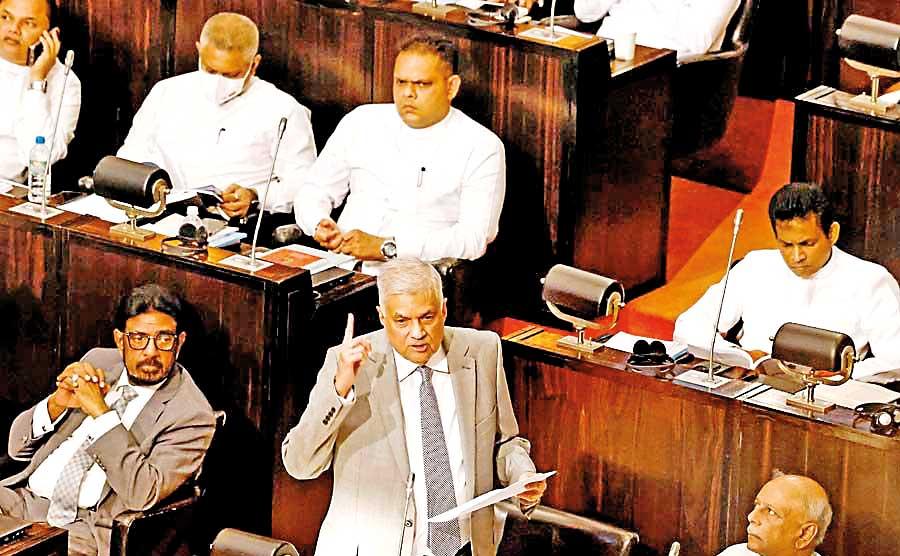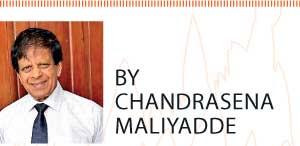14 Dec 2022 - {{hitsCtrl.values.hits}}

President Ranil Wickremesinghe presenting Budget 2023 in Parliament
“Our wedding will not be celebrated by falling into debt internationally.” This is what President Ranil Wickremesinghe (dress designer) stated when presenting his budget (bride). Any pleasure, enjoyment, happiness, benefit or otherwise, the budget (bride) would bring is solely for the citizenry (bridegroom). So, it is for us (bridegroom) to find out what is hidden and waiting in the budget (bride) for the recipient. Let us (bridegroom) begin the merciless impatient job of searching.
pleasure, enjoyment, happiness, benefit or otherwise, the budget (bride) would bring is solely for the citizenry (bridegroom). So, it is for us (bridegroom) to find out what is hidden and waiting in the budget (bride) for the recipient. Let us (bridegroom) begin the merciless impatient job of searching.
The president starts paying homage to the International Monetary Fund (IMF), which has imposed a couple of additional conditions to its usual familiar conventional prescription. Introduce a strong mechanism to prevent corrupt practices and get the consent of bilateral lending partners (mainly India and China) for restructuring their loans, quietly passing the ball onto our courts. Other conditions are customary fiscal consolidation, monetary discipline and stabilisation. The IMF is loyal and responsible for making space for international trade than making breathing space to a nation declared bankruptcy.
The president states, “The process of building a new economy suitable for the modern world would be initiated through the budget proposals of 2023.” He describes his attachment to the historical events and dig into the past to find fault with everyone except his beloved uncle (President JRJ) and himself. According to him, both ‘maama’ (uncle) and ‘baena’ (nephew) have had a vision and a passion for their motherland. He admits the economic base created in 1977 is no longer relevant for the present and it is broken. He quotes from Buddha’s ‘Samachchapala Sutra’, Sugathapala Silva’s ‘Marasad’ and two articles by Gamini Viangoda and Chinthana Dharmadasa, leaving economic literature out.
The budget states: “There is no future for the country by continuing on this popular path. … So, let’s think a new. Let’s create innovative approaches to move the country forward.” The president speaks of ‘The new basis of the economy’, using different terms and referring to different measures. Below are a few I picked up: a new economy, new basis of the economy, revitalise the economy, new foundation for the economy, rebuilding the country, revive the country, a new journey, the way forward, situation must be changed, a policy environment should be created, regulating economic activities, to match the lifestyles that young people aspire, focus on taking care of poor and vulnerable groups, services should be made more efficient, maximum benefits should be derived, manner in which our welfare programmes could be implemented, investing in infrastructure, correcting market failures, maintaining law and order, envisaged economic reforms and reorganisation, focus on modernisation, economic transformation, common social agreement, move towards rapid economic growth, social market economy or social-security-open-economy, create a competitive and high-performance modern economy, a new approach in making Sri Lanka a developed country, budget proposals different from the traditional, prosperous economic environment, undertake onerous duty for the country.
New basis of economy
I took quiet sometime to comb through the budget in search of “The new Basis of the Economy”. I ended up with dismay and disappointment.
The government revenue is expected to increase by correcting tax cuts introduced in late 2019, changing income tax, Value Added Tax (VAT) and unprecedented tax on beedi sticks. Every successive finance minister, perhaps except Dr. N.M. Perera, has been playing with tax rates. However, none has considered widening the tax base and other roles of tax. The president expects interest rates to gradually reach a moderate level. Nevertheless, the governor contradicts and says the Central Bank is the sole authority of the country’s finance.
The budget proposes setting up new economic zones in the Western and North-Western provinces, Hambantota and Trincomalee to attract foreign investments. Better, he takes a leaf from the late President Premadasa’s 200 garment factory programme and examines the World Bank Ease of Doing Business Index.
In this new economy, the budget focuses on three main things. A digital economy is one. The president was impressed by the beneficial effects of the QR system introduced in petroleum distribution. However, then having an afterthought, he proposes setting up a data protection authority to regulate the processing of personal data, in order to safeguard the privacy of citizens from adverse impact of digitisation.
The president says, “When Sri Lanka was a low-income economy, the basic necessities of life enjoyed by people were minimal. But having been elevated to a middle-income economy, the standard of living also rose.” Yet, his Cabinet colleagues declared Sri Lanka as a low-income economy.
The FTA with Singapore is proposed to set the stepping stone for Sri Lanka to engage in dynamic regional trading arrangements. Nevertheless, the issue faced in trading is absence of innovative, cost efficient, competitive quality export products. The budget proposes setting up a separate department for the cinnamon industry. If adding more institutions is the answer, three leading agriculture export crops wouldn’t suffer from low production, low productivity, cost efficiency, quality, standards and regularity, as each one of them is blessed with several state agencies.
Three maritime tourism zones will be identified and related infrastructure developed. Our strategic location, gifted natural resources and hidden beauty, skills, traditions, youth and their aspirations referred to by the president in his policy statement provide better ingredients to attract tourists. It is more gainful, cost effective and remunerating with immense benefits and value addition to the local community. What we need is providing decent toilet facilities rather than spending colossal amounts on infrastructure development for maritime zones.
Lost Head, Heart and Hand
An essential ingredient for the new economy is strong, healthy, intelligent, skilful human resource, rich in intellectual wisdom. The Kannangara reforms were introduced with the objective of strengthening three Hs (Head, Heart and Hand). After 75 years, today we have lost all three Hs. We have been naive to changes taken place globally as well as locally. Our examination system is a sieve, which is defined in Wikipedia as a device for separating wanted elements from unwanted material. We retain the unwanted material and call it ‘achievers’ and drop the wanted elements as ‘dropouts’. Providing water and sanitation and internet facilities to a few selected schools and increasing university admission, postgraduate opportunities for doctors, foreign scholarships for AL students and graduates and establishing a new medical faculty proposed in the budget do not address the burning issues in the education sector.
None would deny the need for safety seal (sticker) for drinking water bottles, sanitary facilities for prisoners, upgrading three hospitals and introducing paying wards in government hospitals. Yet, they don’t address the issues in the health sector. It’s already too late but better being late than never to strengthen the primary healthcare facilities, especially in an era non communicable diseases spreading in an unprecedented pace. Prevention is essential, effective and economical. Both education and health systems need an overhaul to produce healthy thinkers instead of rotten tinkers.
After Jackson Anthony rewrote the Mahavamsa to explain the roots of the Rajapakshe dynasty, the president proposes to establish an institution to undertake and facilitate research on the history of Sri Lanka to find roots for the new economy.
The budget has found two innovative measures to ensure food security: electronic system for food safety and development of inland fisheries industry. Our agriculture and aquaculture experts have failed to see these missing links in food security. As the vocalist Nihal Silva recites, a blessed island surrounded by the Indian Ocean doesn’t exploit the abundant fish population in the offshore water and drooping saliva on inshore fishing.
The public sector is too large in the eyes of the president and IMF. In the eyes of the World Bank, the sister organisation of the IMF and the public, the issue lies more in efficiency, performance, unfriendliness, delay, harassment, excessive documentation, lengthy procedures, imbalance distribution, corruption, malpractices and age-old archaic laws. (Forest Conservation Ordinance - 1908, Fauna and Flora Protection Ordinance - 1937, UGC Act - 1978). The World Bank in its Ease of Doing Business Index has placed Sri Lanka behind India, Bhutan, Nepal and Vietnam. This is due to bureaucratic lethargy and lack of institutional coordination. The public service is rule based, not results based; process comes before the product.
Action taken to increase allowances paid to beneficiaries of Samurdhi, elderly, differently-abled and kidney allowances is generous and meritorious. However, a budget should aim materialistic economic dividends. Samurdhi should be an investment programme to empower socially and economically marginalised segment as partners in a development drive, as envisaged by its creator late President Premadasa. We need to be concerned of the exit point more than entry point.
Agriculture is limited to expansion of coconut cultivation, leaving out major export crops tea and rubber and staple food, rice; establishing 10 agro-entrepreneurship villages; producing Triloka Wijayapathra (in our laymen language ganja); reducing post-harvest crop losses and improve storage. Irrigation is brushed off with flood protection systems. Immediate need in irrigation and the water sector is designing a watershed and an end user water management programme. Transport as usual is limited to roads (infrastructure) completely ignoring the mode, especially the public transport.
The president requests all parliamentarians to join and support the journey of bringing positive change to the country. The president himself and Aragalaya highlighted that all successive governments have contributed in bringing this “positive change” individually and independently for good 75 years.
President, a bit of an advice from a person who is little older than you!
Beware of learned “renowned economists” who live in the theory, literature, encyclopaedias and dictionaries with neo liberal influence and insensitivity to ground realities. They dangle the IMF carrot to make you blind for alternative options and opportunities available. I highlighted a few facts lying on the other side of the coin for your sake and more that of the nation. Finally, I recall what my good friend Pali always reminds me: ‘Chandre, you don’t need enemies when you have such friends.’
(Chandrasena Maliyadde was a Ministry Secretary and is currently a Vice President of the Sri Lanka Economic Association. He can be reached via [email protected])
05 Nov 2024 43 minute ago
05 Nov 2024 2 hours ago
05 Nov 2024 2 hours ago
05 Nov 2024 3 hours ago
05 Nov 2024 4 hours ago